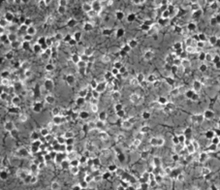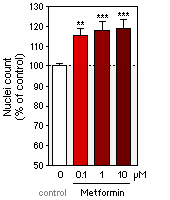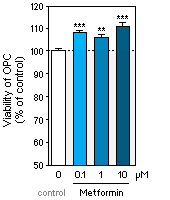Oligodendrocyte Precursor Cells (OPC)
Newsletter # 98

In vitro model
-
Increased viability in OPC cultures induced by Metformin, as measured by MTT assay
Left panel: The MTT assay measures the metabolic activity of cells and thus may reflect the number of viable cells under defined conditions. The graph shows a concentration-dependent increase in the viability of OPC after 3 days exposure with Metformin.
-
Increased nuclei count in OPC cultures following exposure to metformin, as visualized by DAPI staining

Right panel: The graph shows an increase number of nuclei in the OPC cultures after 3 days exposure with Metformin. Nuclei are stained with DAPI (4',6-diamidino-2-phenylindole) and counted by image analysis software. *, p ≤ 0.05; **, p ≤ 0.01; ***, p ≤ 0.001; as compared to the control
Get in touch


 PREVIOUS
PREVIOUS
